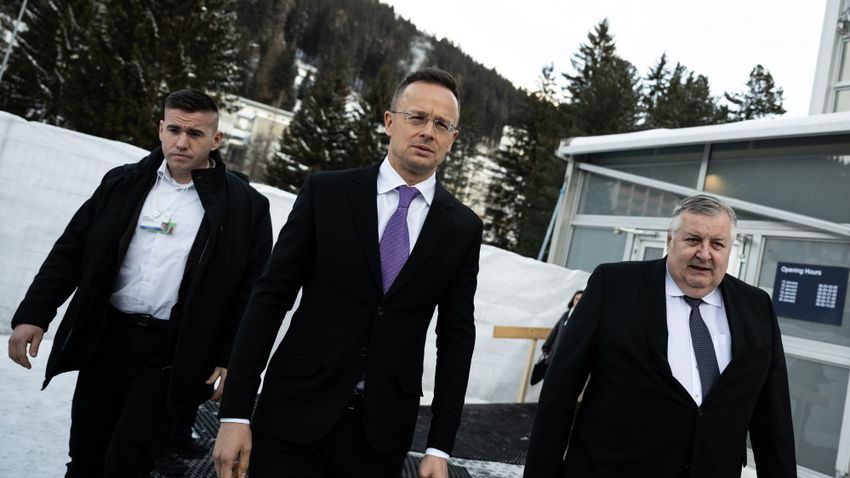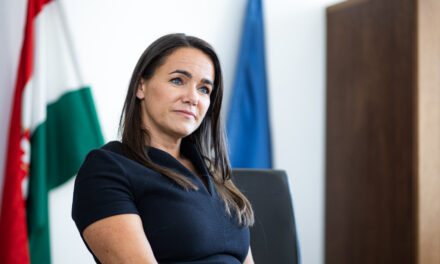It may have surprised many, even on the national-conservative side, that Péter Szijjártó was present and participated in a panel discussion at the annual meeting of the World Economic Forum (WEF) led by Klaus Schwab. Although he did well to go there, talk and negotiate.
There is no doubt, of course, that the ideas of the "Davos elite" about the beautiful new world - about which I myself have written and spoken several times - basically outline an unbearable future for humanity. These were first summarized by Klaus Schwab himself in his book The Covid 19: The Great Reset, published in June 2020, but in the period that has passed since then, his followers, supporters, fellow elites - including the Israeli historian Yuval Noah Harari - have developed their ideas about the great restart in more detail, and today we can know for sure that if these were to be realized, it would not be much different than a "fascist communism", in which the individual, the human being, would continue to live his otherwise unlivable life as a being deprived of all freedom.
In other words, the global financial elite gathered around the WEF, as well as the company of politicians, media personalities, public life gurus, and CEOs of giant companies, really does not seem like the most attractive environment.
And it is also certain that the - actually dystopian, but beautiful to them - ideas about the future, the "fourth industrial revolution", the liquidation of nations, happy people without property, the breakup of families, the total cosmopolitan world society, the they do not exactly reflect the ideas of the Orbán government about the creation of transhumanist, half-human, half-robot-like creatures - to put it quite delicately.
In a word, the question may really arise for many: what was Péter Szijjártó looking for in Davos, where ideas directly opposite to the goals of the Hungarian government, and sometimes even horrible visions, spread their wings?
However, the answer is clear: it was right that Péter Szijjártó accepted the invitation and spent a short time in this environment.
Why am I saying this?
There are two main reasons for this.
One, perhaps the most important, is that the WEF has acquired brutal power in influencing the course of the world's destiny. Remember, 1,600 gigacompanies, 364 governments, 246 NGOs and 234 leading players in the press and media are connected to the WEF.
And let's not forget that about 2,000 people took part in the current meeting, one by one nationally influential personalities, but also at the world level, at least fifty heads of state and government, about 110 billionaires among the biggest, and of course people such as Ursula von der European Commission President Leyen, Larry Fink (Blackrock), Jack Ma (China, Alibaba) and I could go on and on.
Well, where the fate of the world is being decided, you have to be there. You have to be present even if you disagree with almost nothing Klaus Schwab's team represents. You have to be present and try to influence the decisions, you have to represent the national interests.
It is clear that this is an almost impossible task in a field that extends from Bill Gates to Jens Stoltenberg and beyond.
But nevertheless, you have to be there, because you have to show, you have to demonstrate the alternative way of thinking, worldview and value system that Hungary represents in comparison to the mainstream, powerful and resourceful Davos elite.
On the other hand, it is obvious that this meeting is also a good opportunity for our foreign minister to conduct background negotiations that can win certain advantages for our country - if nothing else, exceptional treatment. Just as we were able to get out of the EU sanctions, see the Hungarian special path related to the oil embargo, the obtained discounts.
In other words, it is important for everyone on the national conservative side to see: absolutely not appearing, boycotting these forums is a possible solution, but it is not necessarily the most expedient. It is more expedient not to cut ties with the global elite, to negotiate, but not to bargain, but to try to confront Goliath like David - through negotiations, negotiations, possibly mutual concessions, but still acceptable.
Of course, everything has a limit, for us there are obviously red lines in which we cannot give in - we cannot give in, because then we would give ourselves up.
Because we know from Ady: Petőfi does not negotiate!
Source: Hungarian Nation
Cover photo: Péter Szijjártó, Minister of Foreign Affairs and Trade, and József Czukor, Hungarian Ambassador to Switzerland (right) arrive at the World Economic Forum (WEF) in Davos on January 17, 2023 (Photo: MTI/KKM)












